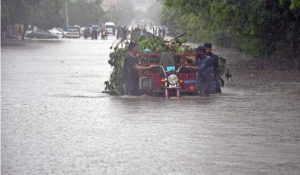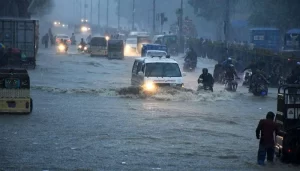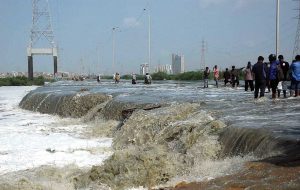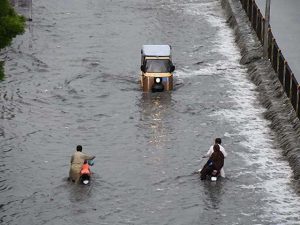Climate Change: Heavy Rains Sink the Economic Powerhouse of Pakistan
The Express Tribune, July 17, 2022

KARACHI: Metropolitan cities are usually where people from different parts of the country migrate to, either to make a good living and/or live a better life. But is that city ready to accommodate them? People come and build a place to live anywhere they find a piece of empty land without noticing why they have been left empty. Laws of a city and government officials help them to make their temporary place a permanent home. This involves not only the public but also the ones who are there to protect people.
What they don’t understand is that when you leave no space for nature, it will make way without caring about anyone who comes in its path. “Nature means no harm; we just get in the way” is what has proven to be true in rains in the recent years when Karachi, the city of lights, faced urban flooding in its poshest and most highly populated areas, halting the movement and business of the city. Be it homes or markets, roads or underpasses, cars or parks, there was one thing in common: all were flooded in the rainwater that was supposed to pass through city’s drainpipes.
Every year, the predictions from the Pakistan Metrological Department (PMD) alert us that it will rain more than last year, but what are the safety precautions taken by government organisations and people? Nothing helps, and in the previous four years, the city has flooded, and people have had to bear losses running in billions of rupees.
This year torrential rains were no surprise, and the whole city was under water when it rained for more than 14 hours straight, from 9 pm Sunday night to Monday 11 am. Rainfall has broken many records, but this is the case each year. The city used to normally deal with 100 ml of rain, but now many parts of the city have rain up to 400 ml.
Ruined businesses
In 2022, rain has affected hundreds of business owners who thought that they were safe, and rainwater would not harm them, but they were wrong. Similar is the story of Muhammad Aslam, who owns a small shop in the Nursery Market, and just because his shop was on a hilly side, he thought it was safe. “Every year, the market fills up with water no matter how clean the drainage system is or how well the grills are fixed. As soon as it starts to rain, all the water starts gathering in the middle of the market, and everything is flooded in two hours,” Aslam shared.
Aslam’s store is smaller than most shops, and he usually doesn’t open it during rain as the whole market is filled with water and reaching it is impossible. “Last year when it rained, I didn’t come to the shop as I knew there would be no way I could reach my shop, but after two days when I got to know that the rainwater was not going away, I got worried, and somehow I managed to reach my shop. When I opened the shutter, everything inside floated in at least two feet of water. Everything was ruined, and it was like the whole of my life earnings floating in front of my eyes,” he lamented, adding that that year, everyone in the market faced enormous losses, some in hundreds of thousands, but many in millions. “All the big shop owners have now come up with the idea to put a four-foot-high barricade over the shutters, which stops the rainwater from directly getting in the shops. But my shop was filled with water again; I had many orders that were ready for delivery after Eid, but now it’s all ruined,” Aslam says.
Azeem Aftab, a 54-year-old shopkeeper, has been selling shoes in a small 4 by 4 shop near Tariq Road for the last 25 years. As PMD was constantly warning about the torrential rains this year, he thought of taking precautionary measures, but shifting all his stock to a godown during Eid days wasn’t possible, so he left everything to Allah. “On the morning of the second day of Eid, I saw several boxes of shoes floating in the water in front of my shop. There was a small space between the floor and the shutter,” Aftab said, adding that his total loss due to rain was an estimated four hundred thousand rupees, which is a huge deal these times when inflation is on the rise.
Saddar and the city’s southern region were most affected by this year’s rain. The rain lasted less than a day. Saddar is one of the most densely populated areas of Karachi, with not just residential buildings but several businesses that operate from Karachi and supply to the upper part of the country. Urdu Bazar is the most popular market for books and related stuff and a place that accommodates businesses that can be entirely ruined by water.
Fazal Muhammad, one of the shop owners in Urdu Bazar, called the scenes during the rain a nightmare. “People from around the country come here to do business and invest all their savings to build a shop and earn money. These shops are worth millions of rupees, and the rents are the highest compared to the rest of the city. These areas should be safe in all aspects, but they are not. Every person in the market knows the condition of the drainage system. Every Friday, we see gutter holes overflowing, filling roads with dirty water,” said the 45-year-old shopkeeper who came from Punjab to do business 14 years ago.
“I have seen this place getting populated. It is not the fault of the people but the administration that doesn’t manage the overpopulation in different areas. Thousands are now using the same old gutter lines built for hundreds of people, and those lines will overflow. During this Eid, when everyone was preparing for qurbani, we were in fear of losing all our stock in the shop,” Muhammad added. He said that every year officials from municipal corporations come and ask for money to make the area safe from floods and to improve the lines. “We don’t mind paying as long as we get something in return. The lines are cleared every year after the rain. Then the whole year, people throw trash out of their shops and homes, and the ones designated to clean up don’t do their jobs, resulting in trash being stuck in drainpipes and chocking them. When the next year rain comes, we are in the same situation as we were last year or even worse as the population is increasing every day,” he said.
“I have lost everything in my shop, I was sitting at home and watching the area videos, and there was nothing I could do. Once the water was drained out, we opened the shops, which is a nightmare that won’t end. We have to put everything back together to start doing business again,” Muhammad said, adding that last year, they elevated the shop on their own, but this year the water crossed the elevation too. “We are not sure what the solution to this is, or if there is even a solution. Maybe, we have to make this a part of our life if we plan to do business here or pray it doesn’t rain.”
Wait or self-help
The most famous market for plastic goods, Bolton Market, which falls in the same Saddar area, was also flooded. Two shop owners, Iftikhar Ahmed and Iqbal Alam, talking about the situation said that the market hadn’t fully recovered from the explosion that occurred months ago, and now this rain has done additional damage. “Once it starts raining, within minutes, we see the gutters overflowing; water is supposed to go in but it’s the opposite. We see water coming out, which is not just the case in heavy rain but also in light rain. When dirty water gathers outside our shops, people resist coming, which damages our business. We wait for the officials to have it cleaned, but when they don’t arrive, we have to do it on our own as we cannot bear any loss in today’s conditions when the price of living in this country is too high,” said Ahmed.
Alam, who drives a cab at night and does business in the morning, said that he started driving a cab to make ends meet, but during rain, both his shop business and cab service are halted, and he bears the monetary loss every minute. “I cannot go to my shop, nor can I take the car out. In both cases, loss is only mine. No one from the government will come to help us. We have to do what we can ourselves,” he said.
The financial burden businesses face due to rain is evident, but many also go through emotional and physical stress, which is something that only time can heal. “I had to shut down my business for now as the loss was not something I can overcome right now,” said Mareekha Jalbani, who owns a salon in the Bukhari Commercial Area. Jalbani’s salon is situated in a basement, and it was flooded to her husband’s waist height. The day it rained, she couldn’t get to the salon because of the heaving downpour, but the next day when she arrived there, the whole place was underwater, with sofas, fridge, massage beds, machines and everything else floating in the water.
After spending around Rs 14,000, water was pumped out, but when they returned the next day, the whole place was underwater again as the neighbouring streets were still flooded. Water was coming even from sockets and electric wiring. “It was devastating to see the water returning as it ruined everything I had set up. A small business, I had saved every penny to start this salon two years ago when COVID-19 hit, and today I’m again standing at point zero,” Jalbani said, adding that the direct loss of the basic items is around five to six hundred thousand rupees. She hasn’t calculated the total amount yet.
The salon was also flooded two years ago, but the damage was not that bad. As a precautionary measure, Jalbani sealed all the windows and doors this time so that it wouldn’t be reflooded, but to her surprise, water found its way from other means. “There was knee deep water on the first day, and thigh high the next day. The area was flooded the same way two years ago, but the administration didn’t do anything this time. They didn’t even unclog the drains.” Jalbani said that she is so devastated by the loss she has to shut her facility down. She thinks that as a future precaution, she will open her salon on the first floor of a building because she knows the situation will never change.
Iqbal Alam said that they would have to work out a way themselves. They do business throughout the year and pay taxes; in return, they get their shops filled with rainwater. “The situation is worse during this Eid when everyone makes animal sacrifices in front of their homes and remains are all around the area. That causes more damage and diseases. We must start doing the right things ourselves and then blame the government. Although the government is doing nothing, we also have a responsibility.
How water takes up space
In Karachi, seen in older maps, are several waterways that used to help in rain drainage and flow the water towards different rivers that drained the rainwater to sea. With time, the city’s construction was done on the waterways, drainages were blocked, and water is now finding its way from the same routes as traffic.
“If you see the drone footages of rain-affected areas, you will realize rainwater flows exactly how paved roads have been made because it is following the same waterway it once had. Today, there are roads there, and when the path was unpaved, the land used to soak some water, and with paved roads, it doesn’t, and therefore, the overflow and additional water are getting into our homes now,” said environmentalist Tofiq Pasha Mooraj.
Karachi is a coastal city that touches the Arabian Sea. Given that the monsoon season in the country and high tide in the sea is at the same time, the ocean doesn’t allow drains to work well, and it rejects the water coming from the city. “Karachi is almost on sea level, and when it rains, water travels to the sea from all rivers—Malir River, Thaddo Dam, Lyari River and all other parts of the city. The drainage system is smaller, and due to high tide, it doesn’t accept much of the water, and it stops it there, which is why water stays still and remains in the city,” Mooraj explains.
What are the measures that can be taken to help manage rains? That is what needs to be considered now instead of blaming each other. “Drainages must be expanded so water can pass by more. For example, the drainage is 10 ft, and it should be increased to 12 ft. It automatically solves 20 percent of the drainage issues. Old waterways need to be cleared, and all the waterways blocked due to construction should be restored so that water can make its way to nullahs and not to houses and markets,” Mooraj says.
The administration
Rain not only makes the daily chores come to a halt but also impacts the businesses that run daily and people who work on daily wages. “The most affected markets in terms of flooding from the rain were small shops and carts in Saddar, while one of the markets that drown every year is the Nursery furniture market where basements and first floors are underwater usually,” said a Karachi Metropolitan Corporation officer. He added that the market drowns yearly, and nothing can be done to save it as it is a crowded place, and the drainage system is flawed.
When the predictions of rains are made weeks in advance, but the situation worsens each year, the Sindh government and the Karachi Metropolitan Corporation play a blame game, and no one tries to resolve the issue that the city of millions suffers from. “No one can fix the mess this city has become in the hands of political parties that are always in a rift. Either it was MQM or PPP in the past, and now PTI and PPP, the only solution is to expand the drainage of the city and start taking preventive measures rather than only clean nullahs every year,” he said.
While talking about the measures taken by the government, the spokesperson to the Karachi Administration told The Express Tribune that the Sindh government is taking all possible measures to tackle rain challenges. “Cleaning of storm water drains is one such important step, among others, to clear the chocking points, besides every effort to ensure that the people suffer the least in the rains. Concerned departments and staff have been mobilized with all available resources to keep a check on the situation in the different parts of the city,” he said.
Talking about the damage that rain did to the businesses following the urban flood in Saddar and southern areas of the city, he said, “It is sad that the business community has suffered due to a heavy shower and faced the losses. However, the government is assessing that as well, and surely, necessary action will be taken to provide some relief. The Southern district was affected more in recent rains with the accumulation of rainwater in the Saddar area. Nearby nullahs are being checked, and heavy machinery is deployed to avoid such a situation again.”
Suggesting that shop keepers keep their places of business safe on their own and help the government, he said, “Shop keepers should keep their stuff in safe places and avoid putting their items on footpaths. I think this would help them save their stuff. Market associations can also play their role in helping the government.”
Whereas the Defence Housing Authority (DHA) has expanded its area to almost the southern district near the sea, the low-lying areas in DHA continue to suffer from rains. “It is not new. However, the government is doing its best to clear the choking points in the drainage system laid in the area. We should not forget that there were unprecedented rains in Karachi. Still, much of the city area was cleared as soon as possible,” said the spokesperson to the Karachi Administration.
The country is suffering
It is not only Karachi; this monsoon season has affected the entire country. According to the official statistics issued by the National Disaster Management Authority, between June 14 and July 14, 176 people, all over the country, lost their lives in different rain-related incidents, of which 78 were males, 47 females, and 51 children. 175 people also got injured, of which 89 were males, 47 females, and 31 children. 1,408 cattle were killed, four kilometres of roads were damaged, four shops were razed to the ground, and 18 bridges collapsed in Pakistan. 894 houses were partially damaged, and 577 homes were completely damaged.
While the government fails to keep the areas and drainpipes clean, the public should also take measures to keep their areas clean and throw trash in the designated spaces and not on the roads. This will not only keep their area clean but also help avoid horrible and terrifying cases during rain. And one day, every citizen in the city would be able to enjoy the blessings of rain.







